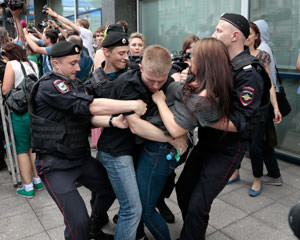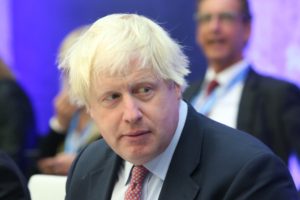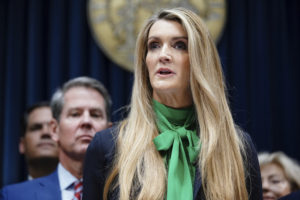Why Russia Fears the Gay
Although gay Americans have cause for celebration this week, Russia's parliament has unanimously passed a blatantly homophobic law.
Although the Supreme Court of the United States this week moved slowly and reluctantly to recognize the rights of married gay Americans, parts of Europe have developed a bad case of old-fashioned homophobia. Pope Francis rambled about the “gay lobby’s” machinations, while France saw violent mass protests against the government’s legalization of same-sex marriage. Russia’s parliament, meanwhile, passed a blatantly homophobic law against “homosexual propaganda.”
It may look like plain bigotry, but Russia’s political leaders are likely scapegoating gays in an effort to draw attention away from more urgent problems.
The vote in the Russian State Duma was unanimous: It decided 436 to zero, with one abstention, to amend the law “on the protection of children” with a passage against the propagation of “non-traditional relations.” Individuals who are deemed guilty of fostering homosexuality, through the Internet or the media for example, can be fined up to $3,000. Organizations can be ordered to pay 10 times this amount, and the authorities can close them down for up to three months. Foreign “propagators” face up to 15 days in prison and immediate deportation.
Elena Mizulina, head of the Duma committee on families, women and children and the measure’s most vocal promoter, stressed nonetheless that the law was not homophobic. According to Mizulina, it does not ban gay pride marches, art, or outlets that merely provide information on homosexuality. Furthermore, she emphasized the change in wording from the cultivation of “homosexualism” to “non-traditional relations.” Asked about the definition of “non-traditional relations,” however, she conceded: “They are LGBT relations, relations that are not between a man and a woman.” The law’s supporters apparently hope that the semantic alterations will spare Russia a further conviction by the European Court of Human Rights.
During a news conference in Holland in April, Vladimir Putin said it was his duty to protect the rights of sexual minorities, “since they are Russian citizens and have no other president.” Following an odd line of argument, he justified the law using Russia’s demographic crisis: “Gay marriages do not produce children,” he said. In order to motivate “the peoples who consider Russia their homeland” to procreate, Putin continued, the government should protect children from homosexual propaganda.
This direct link between the protection of children and homosexuality is particularly disturbing. The law’s proponents argue that it is aimed at protecting children only from attempts at fostering “non-traditional” sexual identities among them at an age when they are particularly susceptible to “seduction.” Like their counterparts in the United States and elsewhere, Russia’s anti-gay bigots see homosexuality as unnatural and as the result of conversion by LGBT organizations. Considering Russia’s traditionalist school system and the extreme marginalization of LGBT groups, the notion that their activities have adverse effects on the country’s children is preposterous.
International criticism of the law has been correspondingly severe. Germany’s foreign ministry under Guido Westerwelle, who is himself openly gay, protested against “the deliberate stigmatization of same sex relations and the threat of prosecution” associated with the measure. The U.S. government, German Chancellor Angela Merkel and EU representative Catherine Ashton also criticized the law, as well as numerous human rights organizations. In an open letter before the legislation’s passing, the European Parliament expressed grave concern about the combination of “homosexuality, bisexuality and transgenderism into one law with pedophilia.”
Conservative church groups rejoiced, however. The Christian Newswire dismissed international criticism as driven by “Eurocrats and the European anti-family left.” World Congress of Families Managing Director Larry Jacobs “wondered why the West can enact laws promoting homosexuality and special rights for LGBT groups while penalizing dissent, but Russia can’t prohibit homosexual propaganda targeted at vulnerable youth.”
Inside Russia, the law enjoys overwhelming support. Opinion polls reveal deep-seated homophobia in Russian society. In a June 11 survey by the Russian Public Opinion Research Center, 88 percent supported a ban on “homosexual propaganda.” Fifty-seven percent advocated fines and prison sentences for homosexuals.
All of these numbers have increased sharply since 2005, no doubt as a result of the politicization of the issue. The federal law follows the passing of bills against “homosexual propaganda” in 12 Russian regions in recent years and was introduced into the Duma by representatives from Novosibirsk in Siberia.
Many observers view the anti-gay legislation in Russia as an expression of a re-traditionalization of society. In a thoughtful commentary, the editors of the liberal newspaper Gazeta.ru disagreed. They saw the bill more as a political strategy by the ruling elite to distract popular attention from the country’s social and economic problems and to create unity by demonizing an unpopular minority: “Who this is is not very important. It could be gays, cyclists or people of other nationalities.” The supposed threat that homosexuals pose to “family values” seems, however, particularly suited to mobilize many conservatives. Right-wing groups in France and the tea party in the United States have applied similar strategies. The decisive difference is that homophobia is now official government policy in Russia.
In its propagation of the bill, the government clearly hopes to rally a conservative majority behind Putin. The president is not as popular as he used to be — the current approval rate of 48 percent is dangerously low for a centralized political system like Russia’s. The law against “gay propaganda,” which, according to Putin, originated “in the regions and reflects the attitude of Russian society,” is thus a populist way of harnessing emotions for political benefit. A similar strategy was also evident in the Pussy Riot trials last year.
The close political alliance between the leadership of the Orthodox Church and the government has blurred the lines between moral and legal questions. On the same day that the State Duma passed the law on homosexual propaganda, June 11, it also agreed to punish those who “offend religious feelings” with fines and up to three years in prison.
Both laws are extremely vague in their wording and are thus likely to promote discriminatory practices. Igor Kochetkov, chairman of the nongovernmental organization Russian LGBT Network, said that the adoption of the law would “open wide opportunities for violent persecution of citizens for their beliefs and create grounds for human rights violations.”
Gay couples in Russia enjoy no legal recognition and face numerous problems when it comes to children, inheritance or even hospital access to a partner. Even though the government maintains that it does not discriminate against them, participants of gay pride marches routinely experience police violence. The laws against “homosexual propaganda” have already led to an increase in anti-gay violence in various Russian regions, and gay publications such as “queer” in St. Petersburg complain that advertisers are canceling out of fear of legal retribution. Gays, lesbians, bisexuals and transgender people thus face a difficult future in Russia, and beyond. Ukraine is currently discussing a similar law.
Your support matters…Independent journalism is under threat and overshadowed by heavily funded mainstream media.
You can help level the playing field. Become a member.
Your tax-deductible contribution keeps us digging beneath the headlines to give you thought-provoking, investigative reporting and analysis that unearths what's really happening- without compromise.
Give today to support our courageous, independent journalists.






You need to be a supporter to comment.
There are currently no responses to this article.
Be the first to respond.